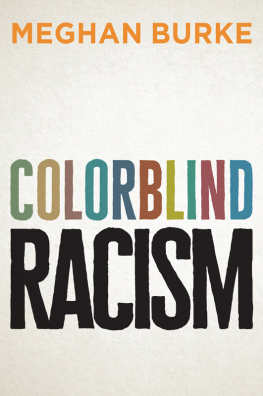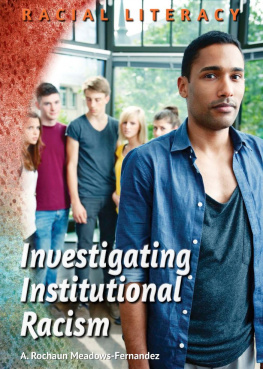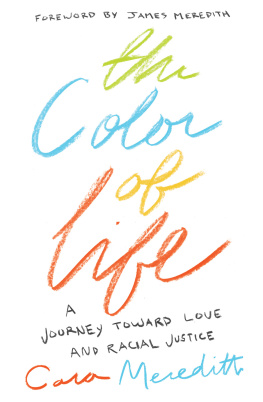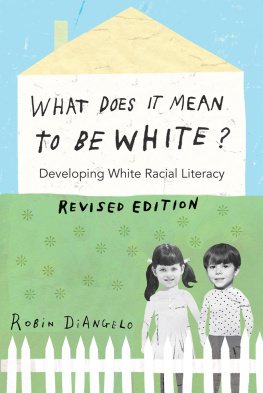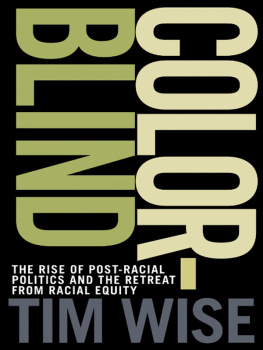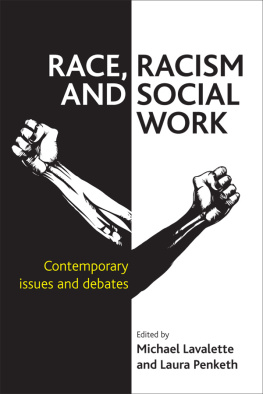
Copyright page
Copyright Meghan Burke 2019
The right of Meghan Burke to be identified as Author of this Work has been asserted in accordance with the UK Copyright, Designs and Patents Act 1988.
First published in 2019 by Polity Press
Polity Press
65 Bridge Street
Cambridge CB2 1UR, UK
Polity Press
101 Station Landing
Suite 300
Medford, MA 02155, USA
All rights reserved. Except for the quotation of short passages for the purpose of criticism and review, no part of this publication may be reproduced, stored in a retrieval system or transmitted, in any form or by any means, electronic, mechanical, photocopying, recording or otherwise, without the prior permission of the publisher.
ISBN-13: 978-1-5095-2441-9 (hardback)
ISBN-13: 978-1-5095-2442-6 (paperback)
A catalogue record for this book is available from the British Library.
Library of Congress Cataloging-in-Publication Data
Names: Burke, Meghan A., author.
Title: Colorblind racism / Meghan Burke.
Other titles: Colourblind racism
Description: Medford, MA : Polity Press, [2018] | Includes bibliographical references and index.
Identifiers: LCCN 2018010022 (print) | LCCN 2018015216 (ebook) | ISBN 9781509524457 (Epub) | ISBN 9781509524419 (hardback) | ISBN 9781509524426 (pbk.)
Subjects: LCSH: United States--Race relations. | Race awareness--United States. | Racism--United States.
Classification: LCC E185.61 (ebook) | LCC E185.61 .B9555 2018 (print) | DDC 305.800973--dc23
LC record available at https://lccn.loc.gov/2018010022
Typeset in 11 on 13 pt Sabon
by Fakenham Prepress Solutions, Fakenham, Norfolk, NR21 8NL
Printed and bound in the United Kingdom by Clays Ltd, Elcograph S.p.A.
The publisher has used its best endeavors to ensure that the URLs for external websites referred to in this book are correct and active at the time of going to press. However, the publisher has no responsibility for the websites and can make no guarantee that a site will remain live or that the content is or will remain appropriate.
Every effort has been made to trace all copyright holders, but if any have been inadvertently overlooked the publisher will be pleased to include any necessary credits in any subsequent reprint or edition.
For further information on Polity, visit our website: politybooks.com
Preface
Americans relationship with racism is an anxious one. Few can deny the realities of our racial past, given the histories of slavery, conquest, Jim Crow, and the Ku Klux Klan. And yet few want to acknowledge the realities of our racial present: deep segregation in our neighborhoods and schools, disparities in wealth and policing, and so much more. Even fewer are willing to explore their own complicity in racial inequalities; many will say that the thing they most fear being called is racist. And so, many reply to the simple claim that black lives matter by saying instead that all lives matter intentionally or otherwise burying the very need to assert that race matters. After all, most of us dont want it to matter we deeply cherish the ideal of a society where individual qualities are what make or break a person, and dont know what to do with the reality that this is not the society in which we live.
Colorblind racism is fundamentally about denying the reality of ongoing racism, and/or the impact that historical forms of racism still has on the present. Its an ideology a common sense way of looking at the world that explains what we see around us ongoing advantages for white people and barriers and violence toward people of color. Its ideological because it makes these realities too neat and clean some people dont work hard enough, arent respectful, dont have the right values, etc. And its ideological because it takes race and racism off the table for these considerations; it wont let us recognize race and racism because to do so would radically change the way so many of us make sense of the world. It would also change the way we see our country, our schools, our workplaces, and our selves.
However, once we can get over this hurdle, we can see why we should, and must, pay attention to race and racism. We can see not only the deep barriers and pain that racism causes for those disadvantaged by it, but also ways, even if seemingly small, that we might be able to leverage some of our own personal and institutional power to make things better. This is difficult work, which many of us do not want to do, lest we come to reckon with our own complicity in an unfair and violent system. But it is necessary, in order for us to realize our shared humanity and to protect our shared futures.
This book will explore this phenomenon of colorblind racism the ways in which failing to look at race actually advances racism. It will do so first by detailing what is meant by colorblind racism how it is defined and understood, and how social scientists and others have attempted to study and analyze it. It will then take a deep dive into history, exploring both the history of racism in the United States and how the scholarship around it has both reflected and sought to challenge it. It will also help us to see how we got into this paradox of colorblind racism a society where removing many overt, state-sponsored forms of racism such as the Jim Crow laws did not in fact eradicate racism, but perhaps made it even harder to name and challenge.
After that, it will canvass what we have been able to learn about colorblind racism: how it lives in our institutions, culture, and interpersonal relationships. A vast body of scholarship has demonstrated the existence of its most common ways of talking and thinking about race, and the impact that this has had on our everyday (and every-night) lives. After that, it will also begin to explore the messier terrain of what are often more complicated ways of making sense of the world around us, and how even our scholarship around colorblind racism has prevented us from seeing most fully the dynamics of contemporary racism and, in some cases, resistance to it. The book concludes with details about some new ways of studying what is sometimes called this new racism, and some brief notes about how to see and challenge contemporary racism, whether it is colorblind or not.
This book is intended for anyone who has not yet explored this phenomenon deeply students, teachers, those just entering this area of scholarship, and others. I hope it will also be useful to people who are interested in race and inequality in their communities, schools, places of religious practice, and so on. One short book like this is not meant to tell us everything that is important to know about our racial history or present. However, it is my hope that by scratching this surface, by beginning to see what we often do not wish to see, and by considering how adherence to colorblind ways of talking and thinking about race can be a form of complicity with racism, we will be able to foster new tools for studying and challenging it, and therefore be able to adhere to the ideals that mean so much to us in our world.
Acknowledgments
Writing a book, while a solitary day-to-day practice, is in the end always a community effort. My first thanks go to Kathleen Korgen, who first recommended me for this project and who has also found a number of other ways to amplify my signal as a scholar and to send opportunities my way. From there, Jonathan Skerrett at Polity has been a pure delight to work with, from his first communication offering the opportunity to write this book, to his helpful feedback on the prospectus, and his sharp eye, coupled with warm support, at each stage of the editorial process. Jonathan, as well as Amy Williams toward the end of her time there, Susan Beer for her careful eye on edits, and the rest of the team at Polity, together with peer reviewers, who gave very helpful feedback, are all to be given credit for this books potential to reach students and scholars and for helping to make this book a resource for those interested in contemporary racism.
Next page
